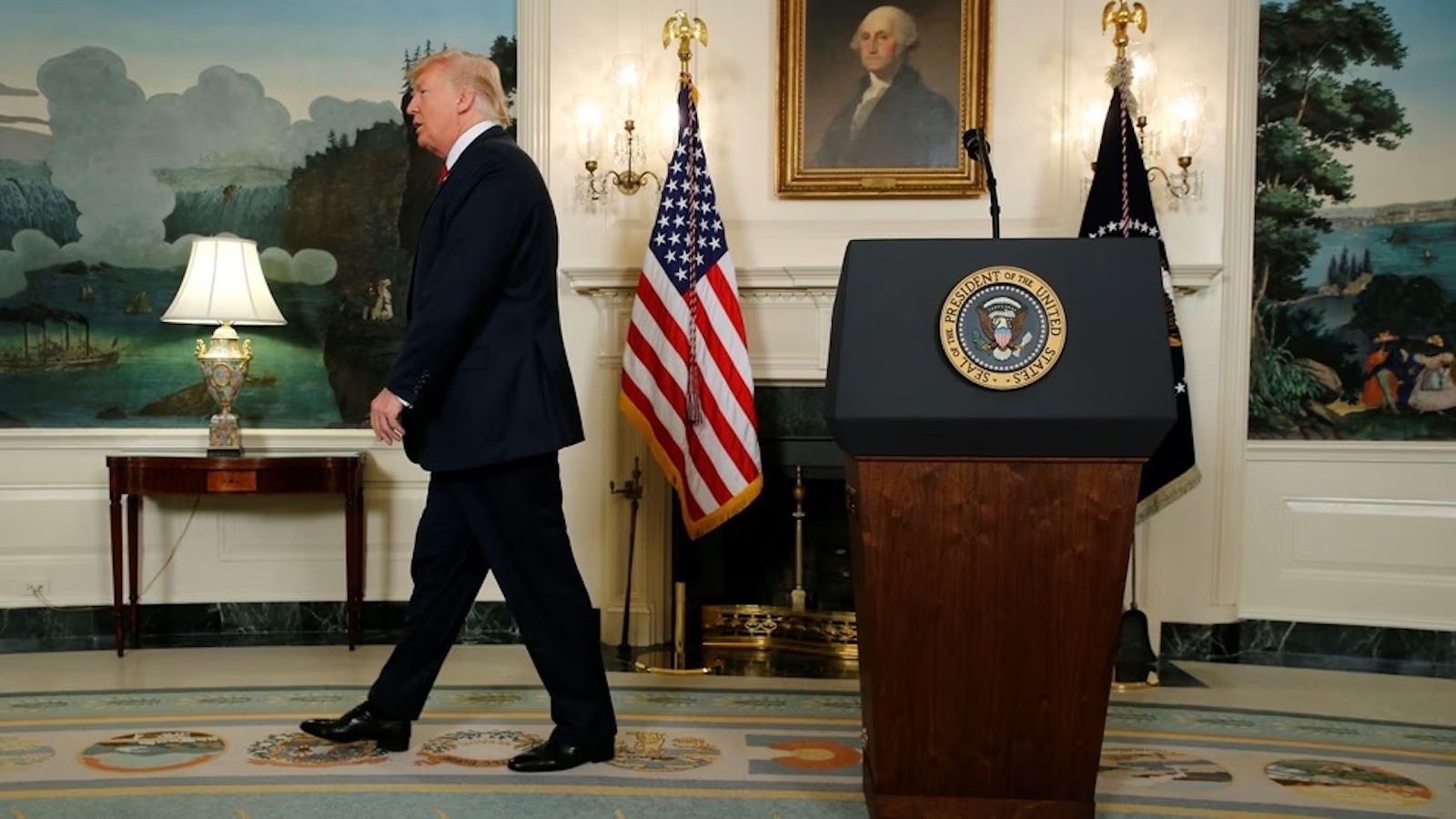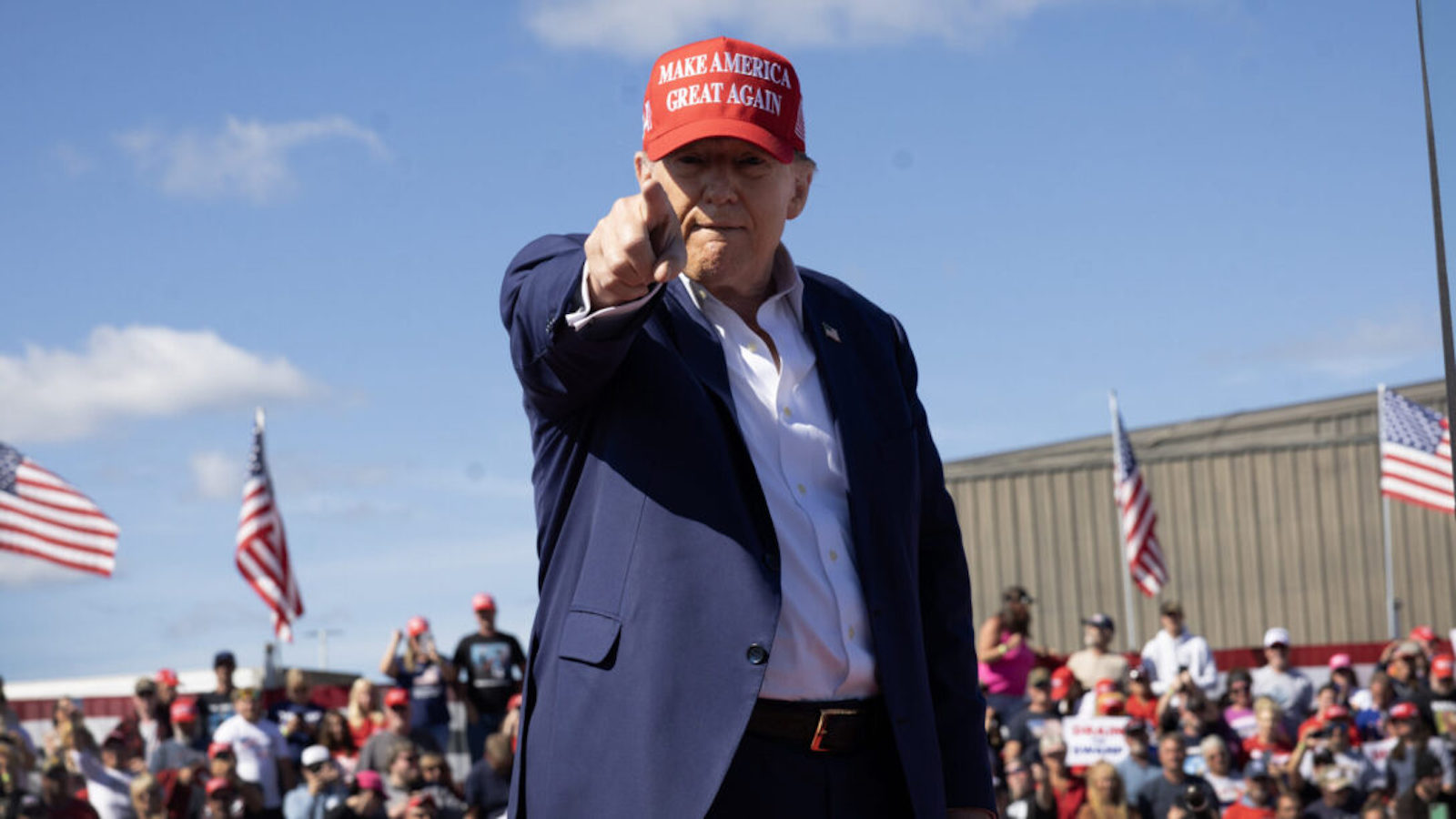
Lecture #11, Division of Labor + Free Trade is Freedom
Human Action Principles
March 5th, 1995
Lecture Number Eleven
Ladies and gentlemen, this entire session will be on two principle topics. The first is the single most destructive idea in the history of human thought, and the second is a simplex means for the obsolescence of war. Now if we can handle both of those in a single session, I’ll assume you’ve got your time’s worth. Is that fair enough? Have you got your time’s worth if we can bring an end to war and explain how to do it? Because it took the lectures leading up to this to do that.
I’ll begin with a discussion of the single most destructive idea in the history of human thought. You may be surprised to learn that the most destructive idea ever conceived comes from the mind of a man for whom I have both considerable respect and admiration. Since the writings of the classical literature of Greece and Rome, this man remains one of the most influential authors in history. This man has influenced such intellectual super-giants as Francis Bacon.
He’s influenced no less an intellectual than the illustrious William Shakespeare. If you read his plays, you realize Shakespeare was a major intellectual. He’s influenced one of the great philosophers of all time, John Locke. And in 1580, some four centuries ago, this man, at the age of 47, published two books with the simple title of, Essays.
The author of these essays from the French province of Bordeaux was the illustrious Michel Montaigne. Three centuries after Montaigne, another essayist, Ralph Waldo Emerson – you’ve read his works – said, “This book of Montaigne, the world has endorsed by translating it into all tongues.” That’s quite a tribute from the great essayist Emerson.
Tragically for mankind, just one sentence from Montaigne’s essays has started a regressive domino effect that may end, ultimately, in the destruction of all of civilization. In fact, the regressive domino effect may end in this less than desirable ending. What could one man possibly have said 400 years ago that could have such a destructive impact today?
His statement does not even shock us until we understand it. He said, “No man can profit except by the loss of others, and by this reasoning all manner of profit must be condemned.” Please note, Montaigne’s statement does not allow for exceptions. He says, “No man can profit except by the loss of others.” In other words, A can only profit when B suffers a loss. B can only profit when A suffers a loss.
The final part of the sentence does not allow for exceptions. By this reasoning, all manner of profit must be condemned. Ladies and gentlemen, the long-run consequences of a successful condemnation of all manner of profit is grave indeed. In the end, it means that man will be condemned to extinction through his own stupidity. Therefore, in view of the magnitude of the regressive domino impact of all of this, it is not enough to simply state that the Montaigne statement is wrong. That’s not enough.
It must be scientifically refuted. In contemporary language, the Montaigne dogma, “No man can profit except through the loss of another,” can be named the win-lose mentality. First of all, what is a mentality? A mentality is a habitual way of thinking. I will demonstrate that this dogmatic way of thinking has become a habit among the educated. It can be expressed in this way, the win-lose mentality – for me to win, you must lose.
First of all, Montaigne’s mentality on profit was not original to him. The same negative image of the means to profit was displayed by many ancient Greek and Roman writers. Montaigne had read much of this classical literature, which likely influenced his opinion on the causes of profit. Because Montaigne was the first popular writer of the modern age to restate this classical dogma, Monesis himself called the whole thing the Montaigne Dogma. A dogma, of course, is any firmly established belief.
If it is a firmly established belief, then it is also a habitual way of thinking. And so the Montaigne Dogma and the win-lose mentality are the basis of all modern doctrines that have taught the educated classes that a free market economy and its profit system create irreconcilable conflicts of interest between various social classes.
This conflict of interest is usually referred to as the class struggle. And so, the Montaigne Dogma is the basis of the concept called the class struggle. We hear references to this so-called class struggle every day. In fact, the first 10 pages of every daily newspaper are devoted to the daily coverage of this struggle. We are told there is a great social polarization of classes all struggling against each other. It is the clash of the classes.
My friend, just which classes are clashing? We’re told every day, here’s what it is. It’s the upper classes versus the lower classes. For the upper classes to win, the lower classes must lose. It’s Nation A versus Nation B. For Nation A to win, Nation B must lose. It’s producers versus consumers, employers versus employees. For employers to win, employees must lose, or the reverse, for employees to win, employers must lose, and so forth.
Entrepreneur versus worker. Management versus labor. The union versus the company. We have all been taught that there is a natural conflict of interest between these classes. We’ve been told that nature requires these clashes between the classes. Furthermore, it is said that the only means of ending these clashes between classes is to end the classes.
In other words, in a society in which there are no classes, there can be no class struggles. Therefore, if we can do away with the classes, we can do away with the class struggle. What do you think of this idea?
Student: That it’s called communism isn’t it?
That’s one form of it. If everyone’s clothing is the same, everyone’s schooling is the same, everyone’s possessions are the same, everyone’s income is the same, then the classes will disappear, and with this disappearance there will be nothing left for man to struggle over. What do you think of this idea?
This is a dominant idea embraced by a wide sector of the intellectual community. It is a dominant idea embraced by intellectuals and the educated in general all over the world. The goal should be, it is said, one class, or uniclass, because if there’s only one class, that’s another way of saying there are what? No classes.
One of the grand conclusions of this idea is that there should only be one sex. Now don’t laugh. This is a popular view.
If there is only one sex, or unisex, then there will no longer be a class struggle between the male class and the female class.
Ladies and gentlemen, the main difficulty with the idea of doing away with the class struggle by doing away with the classes is that you can never do away with the classes. It is a natural thing for us to attempt to understand the universe around us by putting different things into different classes. In this manner, I’ve stressed a major input into your ability to get a lot smarter a lot faster.
I’ve said there are only three progressive classes of people who contribute to all of man’s progress. Who here for the first time thinks he or she can name them? Let’s see a show of hands. Go ahead.
Student: entrepreneurs, technologists, and investors.
That’s all three. You got it. If I were giving scores, that would be 100 percent.
I also call these people the super-progressives or the super-humanitarians. Here they are again. These three classes, again, are the cause of all of man’s progress. It is in everyone’s interest, then, to encourage these classes to prosper in order that who else will prosper? Everyone else.
There will always be a class called man and another class called woman. What can I say? The difference between these two classes only happens to be essential to the survival of the entire species. I think the popular, well-known French expression is not inappropriate: Vive la différence. Freely translated, the difference lives. And without this difference, we won’t live.
However, the question we must answer is does the difference between the class of men and the class of women cause there to be a struggle between the two? Is there a natural struggle between, for example, employer and employee, between entrepreneur and worker, between management and labor, between the union and the company?
The Montaigne Dogma says, yes, for a member of one class to profit, another class must suffer a loss. Since the goal of science is to know reality, is the Montaigne Dogma consistent with reality? If we accept it as true, we must conclude it is a natural thing for virtually everyone to be at war with one another because they are all natural enemies.
I have this question, is an entrepreneur a natural enemy of the people who work for him?
A lot of people think so. Let me give you a headline from a union paper published by the transport workers union of America, AFL-CIO. The headline read, “Unite in TWU to Fight the Real Enemy, the Company.” TWU stands for Transport Workers Union. What do you think of this headline? Would you like a free translation of this headline?
This headline says, if you work for the company, congratulations, sir, you work for the enemy. It says there is a natural struggle between two distinct classes. The entrepreneurs who run the company are one class, and the workers who have careers or jobs with the company are the other class. Both of these classes are natural enemies, it says. They are at war with one another.
“Unite in Transport Workers Union to Fight the Real Enemy, the Company.” The workers must fight the enemy, the entrepreneurs. When the entrepreneur creates a profit, what does this mean? According to the Montaigne Dogma, no entrepreneur can profit except by the loss of others. The company wins, the workers lose. The producers win, the consumers lose.
In order to scientifically evaluate the Montaigne Dogma, we must examine just what the concept of profit means in a free market society. This is a major, important, essential definition. Entrepreneurial profit; wherein consumers are willing to purchase the entrepreneur’s product at a price that exceeds the total cost of production. That’s what it means.
The question we must answer is, will the achievement of entrepreneurial profit as I have defined it result in a loss to somebody else? In other words, is loss the means to profit? Is A’s loss the means to B’s profit? The amazing thing about the Montaigne Dogma is not that it’s inconsistent with observation and therefore completely wrong.
What is amazing is, within a free market society, the exact opposite occurs. If any entrepreneur expects to achieve profit, what kind of action must they successfully execute? When your goal is profit, then you want to completely avoid those actions that will add to the distress and dissatisfaction of your customers.
You must be sensitive to what every customer wants. Every customer seeks to purchase the attainment of some end of greater satisfaction. This is the reason every consumer boss is a consumer in the first place. The goal of a successful entrepreneur is to alleviate or remove the causes of his customers’ dissatisfaction.
How do we know the consumer is always consuming for greater satisfaction? All human action involves the employment of a means aimed at the attainment of some end of greater satisfaction. That’s the law of human action. What if your goal is to make a profit in the role of any of these four: the farmer, the food processor, the grocery market owner, the restauranteur?
If, please note, you merely alleviate your customer’s feelings of hunger, believe me, there won’t be much profit. You can alleviate their hunger by feeding them, for example, a plate of SPAM and a bowl of mush for a few dollars. But the greatest profits will be earned by those entrepreneurs who take away their customers’ hunger in the most enjoyable way at the lowest price. That’s where the profits are.
If the eating experience is enjoyable enough, the customer will be willing to maybe pay $50 a person to have steak Diane, a Caesar salad, some vintage wine, and crepe suzettes drenched with cognac for dessert. You might pay $100 for this. Could this happen? Does this happen? Per plate, per person, $100. Would anybody do that, pay $100? Can it be done?
Yes. It is done all the time, isn’t it? How are they able to pull this off? With or without the company credit card, how are they able to pull this off, night after night, get you to pay $100, and, if there are two of you, $200? How do they get you to do this?
They’re going to make this a truly enjoyable experience, and you’ll do it again, right? Some of you consider it value for your $100. Some people do, or they wouldn’t keep doing it.
We may conclude with confidence that entrepreneurs are not at war with their customers. There is no class struggle here. On the contrary, the greatest profits will be earned by those entrepreneurs who satisfy the most urgent demands for products at the lowest price.
Here’s another question I will briefly answer. Can Entrepreneur A’s profit be the result of Entrepreneur B’s loss? This is very important. It’s totally missed by almost all people.
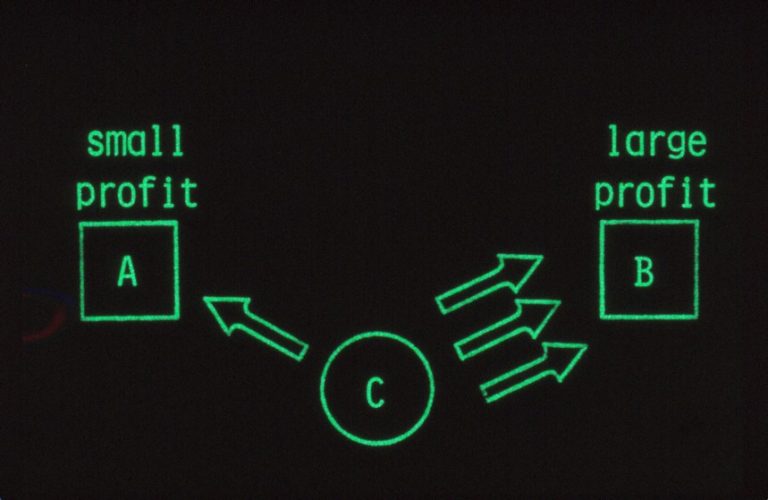
Let’s assume that Product A and Product B are similar products, and for some time now most of the consumers have been purchasing Product B. These are consumers going after Product B.
Entrepreneur A continues to make profits. He only has a few consumers indicated by one arrow, and he keeps trying to improve the quality of his products, to give better value.
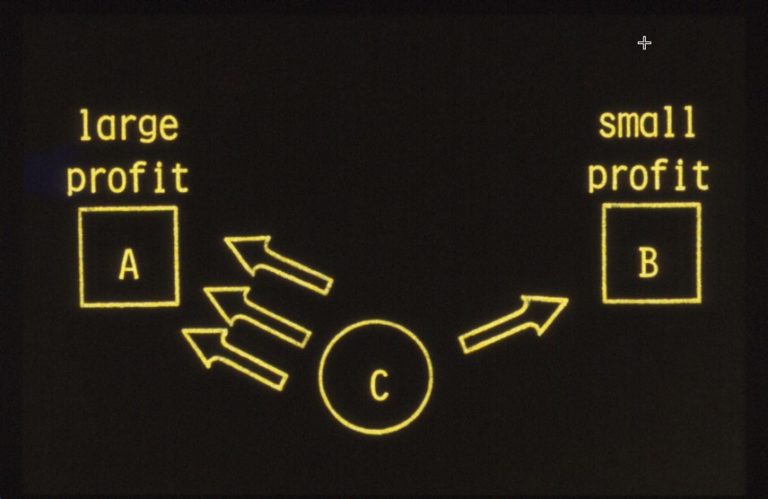
As a result, the consumer bosses have been switching their market votes from Product B to Product A. The consequence of the consumer switch from Product B to Product A is that Entrepreneur B suffers losses, and Entrepreneur A achieves even greater profits.
The question is, is Entrepreneur A’s profit the result of Entrepreneur B’s loss? Almost everyone would say yes, but the answer is no. It’s important to know why. The answer to the question can be found in coming up with a precise definition of a unique kind of loss. All of us, in our lives, will experience many kinds of loss, but where there is a free market entrepreneurial loss, as defined in this seminar, science has only one meaning. Let’s look at it again.
I gave it to you before. Entrepreneurial loss occurs when the entrepreneur produces products which the consumers are unwilling to purchase at a price that exceeds the total cost of production. Ladies and gentlemen, in a free society, this is the cause of all entrepreneurial loss. In simpler language, the buyers have rejected the seller’s offer to sell.
It may be that the entrepreneur failed to correctly anticipate the future demands of the consumer. It is even possible that the entrepreneur’s only failure was their inability to see into the future. Both the seller and buyer have this disadvantage. It would be a universal boon if all members of a market society could correctly foresee all future market conditions in time and act accordingly. This, possibly, if it could be done, would be a great boon.
And if it could be done, no tool of production, materials, or labor would ever have to be wasted in satisfying the most urgent requirements of the consumers. However, since the entrepreneur is not omniscient, all they can do is produce a product that he hopes, based on their best judgment, will meet the most urgent demands of the consumers. In the free market, that final decision always is in the hands of the buyer.
The free market then gives the buyer the optimum choice. The buyer then gives the entrepreneur’s product either thumbs up or thumbs down. And so, when an entrepreneur earns a profit on a product that buyers scramble to purchase, with that achievement, a profit can never cause a loss to another entrepreneur ever. Never.
The fact that the consumer bosses either gradually or suddenly choose Product A over Product B should not even be a cause of resentment on the part of the producers of Product B. The consumer does not owe his allegiance to the producer. If he does, what’s that called? Servitude. exactly. That’s servitude. The producers of Product B are not a privileged class to which consumers owe their market support. A consumer can only be the boss where all producers are without special privilege.
Product B may even be the superior product at the lowest price. Is this possible? Can the better product at the lower price still suffer losses? Yes. In that case, it’s up to the producers of Product B to convince the buying public of the superiority of their product over all others. Even though it may be the best product at the lowest price, you still have to convince the buyer that it is.
The main lesson to learn here is that profit earned by Entrepreneur A is not the cause of a loss earned by Entrepreneur B. When Entrepreneur B was earning the larger profits, those profits were not caused by Entrepreneur A’s losses. Where there is a free market, each entrepreneur is the author of his own profits and losses.
Hence the Montaigne Dogma, “No man can profit except by the loss of others,” simply does not apply to the free market. In all fairness to Montaigne, he published his essays in 1580. That was 200 years before the American Revolution and long before the free market even started to evolve.
Let’s look at another wording by Montaigne of the Montaigne Dogma. “The gain of one man is the damage of another.” Can this generalization ever be true? Depends entirely on the source of gain. If a man’s gain is due to private robbery, government robbery, acts of war, acts of interventionism, then another man clearly has been damaged. The robber’s plunder always damages the despoiled victim.
It’s most important that we make a clear distinction between two opposite concepts, war versus commerce. The term price war is an internal contradiction. What is war? War is coerced exchange on a grand scale. In sharp contrast, commerce is free exchange on a grand scale. Opposite concepts. But this important distinction has not been clear. Even the people who possess great minds, even Voltaire, who possessed one of the greater minds, erred greatly on this point.

The 18th century French writer Voltaire, seen here, remains to this day one of the greatest of all refuters and debunkers of popular fallacies and superstition. But in writing his famous Philosophical Dictionary in 1764, a dozen years before the American Revolution, Voltaire tells us, “To be a good patriot is to wish that one’s own community should enrich itself by trade and acquire power by arms.”
He concludes, “It is obvious that a country cannot profit but at the expense of another and that it cannot conquer without inflicting harm on other people.” It’s ironic that Voltaire, the great destroyer of popular fallacy, would himself unwittingly throw his own weight behind the popularization of the most destructive intellectual fallacy in history, the Montaigne Dogma.
Why is Voltaire’s error so serious? Why is his blunder so large? Because the Montaigne Dogma is the root of war. As we near the end of the 20th century, it is still believed that the object of foreign trade is to get rich at the expense of foreigners. We must reject this false cause of prosperity and embrace the true cause of prosperity. To accomplish this, we must first expose the Montaigne Dogma to a scientific analysis that demonstrates the falseness of this doctrine. That’s why I’m giving you this lecture.
I want to identify, explicitly, today’s popular myths concerning the cause of war that are most commonly taught in what are called colleges and universities. It is said that the conflicts, which have brought about the civil wars and international wars of the 19th and 20th centuries have been caused by unavoidable collisions of economic interests.
Furthermore, these economic conflicts are an inherent feature of free market economies. For example, you get this myth, a popular myth, the cause of Civil Wars? A class struggle. Wherever you find this class struggle explanation, you will find the Montaigne Dogma behind it. It is a fallacy. It is said civil war is a result of the exploited masses against the exploiting upper classes.
Along with this comes another popular myth, the cause of international war? A class struggle. It is said the cause of international war is a result of the poor nations against the wealthy nations. The wealthy nations have grabbed, we are told, from the hands of the poor nations, an unfair share of the Earth’s natural resources.
We are told these wealthy nations possess insatiable greed that drives them to seize resources that were destined for the use of the poor nations. In your role of becoming a human action scientist, you must ask, is this a correct explanation of the cause of war? For one thing, the class struggle fallacy actually claims that the non-interventionism of the free market causes the interventionism of war.
That’s part of the fallacy. But non-interventionism does not cause interventionism. The progressive domino effect of non-interventionism causes – guess what? More non-interventionism. In a like manner, love generates love. If non-interventionism causes non-interventionism, what do you think interventionism causes, then?
You got it. The regressive domino effect of interventionism causes more interventionism. Retrogressive and regressive are used here as synonyms. In a like manner, hate generates hate. You’ve noticed? It is not the free market that generates conflict of interest between nations and people, but rather the interventionist policies of the nation’s governments that restrict and distort the normal operation of the free market.
These interventionist policies impose trade and migration barriers. They discriminate against foreign labor, foreign products, foreign investment. Every one of these interventionist policies causes conflict, and not one of these conflicts could have emerged within a free market society.
As you will see in later lectures, every one of these interventionist policies is enacted on behalf of someone who is demanding from the government some form of special privilege. My friends, as painful as it may seem to some, in order to achieve world prosperity and world peace, we must completely abandon the policy of government imposed special privilege.
Every nation on this planet has been endowed by nature with a great wealth of natural resources. You cannot find one nation that’s an exception. There’s only one difference between a rich nation and poor nation. The resources of the rich nations have been developed, while the resources of the poor nations remain undeveloped. If your nation is poor, then there’s only one way your nation can become rich.
What’s that? You must produce tools of production faster than what? Babies. That’s the law of prosperity, the principle of prosperity. Tools faster than babies. Since this is the one and only solution there ever will be, then, again the question arises, why don’t these paupers who live in these pauper nations get off their butts and start generating some prosperity? Why don’t they do this, fast, now, yesterday? Why don’t they do this?
Because they are a part of an anti-humanitarian, anti-progressive society with a rigid, politically imposed caste system, which makes outcasts of the super-humanitarians who are the only ones who can save them. There are conflicts of interest between the have-not nations and the have nations, but they are not due to a class struggle. The conflicts, in every case, are derivatives of some form of political or bureaucratic interventionism.
Nevertheless, the stated goals of these nations and their people is peace. What has been their means to peace? We get things like international treaties and covenants. We get international tribunals. We get international leagues, like the defunct League of Nations, or its successor, the United Nations. All of these – I don’t know how to tell you this – they are all false means.
If you erect one of these, it means you don’t know what you’re doing. They all cling to the Montaigne Dogma. As long as they believe they cannot prosper economically except at the expense of other nations, peace for them can never be anything more than a period of preparation for the next war. Economic nationalism is incompatible with a durable peace, and yet economic nationalism is unavoidable where there is government interference with business.
Most of you remember from your school days, a reference to an international organization named the League of Nations. It was created in 1919 by the Treaty of Versailles. The Treaty of Versailles was the formal conclusion of mankind’s then most destructive war, called at that time The Great War. What is it called today? World War I. The mere fact that we had to change the title of that war from the Great War to World War I implies some kind of catastrophic social failure. You see that? A catastrophe of incredible proportions. Because if there’s a war named the First World War, since first implies at least a second, then there must have been another great war named the Second World War.
How many of you think this actually happened? We know from history that there weren’t very many people happy with the effects of the first great war, were they? Read about the writings of people after the first great war. They said this was a huge catastrophe. How could we have ever engineered this? What a disaster. Who could have imagined? How could we have done this?
Yet, if that’s true, why did we repeat history and experience a second great war? For one thing, what were the goals of the men who established the League of Nations? The goal of the League of Nations was to organize the nations of the world to aim toward the common goal of world cooperation and world peace. Do all of you like their goal of world peace? I think it’s great. You couldn’t have a more virtuous, lofty goal.
The men who designed this first League of Nations were good men, intelligent men, educated men, successful men. One of the principal architects of the League was even a Ph.D. You see him in this photo. I hope you recognize him – who is this?
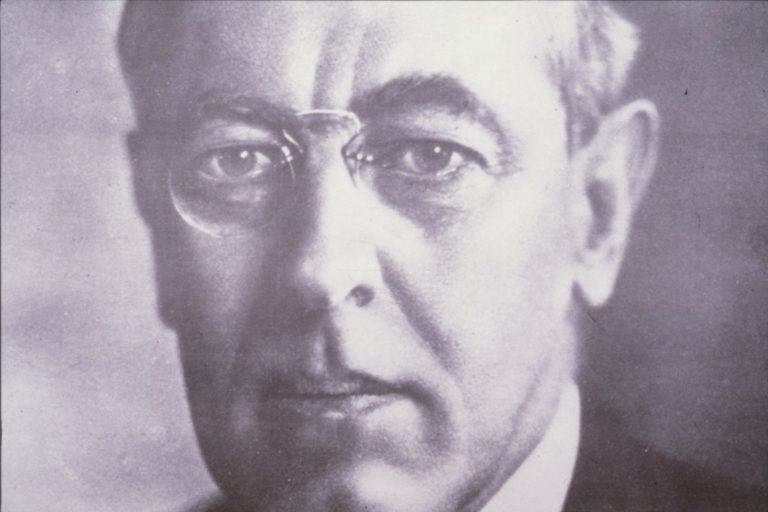
Dr. Thomas Woodrow Wilson
Dr. Wilson was even awarded the Nobel Peace Prize in 1919 for his efforts toward peace.
Why, then, were the nations of the world fighting to the death in the second great war within just two decades after the first great war? Because something was missing in 1919. These good men who wanted peace did not understand two things. Dr. Wilson, with all of his academic wisdom, there were two things he did not understand.
One, he did not understand a science of peace, the science of how to make peace and keep it, and a science of war, how to make war and continue it. He didn’t understand either one of those. To understand one is to understand the other. To know how to optimize war is also to know how to optimize peace. They were missing a science of means. What is it Dr. Wilson didn’t know?
He didn’t have a clue. He didn’t know what he was doing. Lofty goals, dear friends, can only be accomplished when we possess the necessary means to get there. For whom is this true? Everyone in all places at all times. The League of Nations was finally scrapped in 1946 at the conclusion of World War II. Here is what was left of what was once one of the most magnificent cities in the world.

This, my friend, is what was left of Berlin, one of the greatest cities ever erected. The destruction of Berlin is just one small part of the failure of the League of Nations to achieve what? Peace. Berlin is gone. There are new buildings there now. Most of the rubble is removed. But Berlin is destroyed forever. That city is gone. It was pulverized. That’s it for Berlin.
The League of Nations failed for one principal reason. It was a convention of governments dedicated to the establishment of economic nationalism, and they were entirely committed to the perpetuation of economic warfare. While the League’s delegates were orating the familiar rhetoric of goodwill among nations, the governments whom they represented, at the same time, were inflicting every form of economic interventionism upon the world.
After the establishment of the League of Nations, the militant economic warfare that went on among the nations of the world was even more fierce than it had been before the League. In fact, the tariff protectionism and the trade restrictions that the governments imposed before the start of the first great war in 1914, were mild compared with the economic warfare that developed in the 1920s and 1930s.
It was during the two decades of the twenties and the thirties that the League of Nations actually functioned, and it was during these two decades that these nations’ governments actually erected trade embargoes preventing at gunpoint the exchange of goods and commodities among nations. A trade embargo is an overt act of war.
In addition, there were the usual tariffs. There were quantitative trade controls, foreign exchange controls, monetary devaluations. The League of Nations ushered forth the second great war. What, then, are the prospects for peace through its successor, the United Nations? The prospects for peace are even worse. The political and bureaucratic leaders of the world are clearly under the influence of the Montaigne Dogma.
The effect is that every nation looks upon imports of manufactured goods as they look upon a disaster. It is the avowed goal of most of the various nations’ political leaders to bar foreign manufacturers as much as possible from access to domestic markets. The political leaders of the world are fighting against the dread of an unfavorable balance of trade. They do not want to cooperate with one another. They want to protect themselves against the alleged dangers of international cooperation.
How do we solve this problem? How can we attenuate world war and optimize world peace? Is there anyone in this room who would like to know how to do this? Really? Thank you, ma’am. Several of you. Several more. Who’s willing to say, “Snelson, you know, I’m skeptical. I don’t think we will ever be able to solve the problem of war”? Anyone fall in that category? One, two, three, four, four and a half.
Maybe there’s a dozen of you who say, well, you know, I’m skeptical. Who’s willing to say, “If I really thought my actions could make a positive difference, I would be willing to act in the direction of the prevention of war”? Anyone? It appears to be most of the people who also said they were skeptical.
The solution begins with the recognition that the Montaigne Dogma is a false doctrine. That’s a big part of the solution. Entrepreneurial profit is not earned out of anyone’s loss. It is earned by satisfying the consumer demand for the highest-quality products at the lowest prices. It begins with an understanding that the real world is a world of scarcity.
There’s a scarcity of every single product we would like to consume. There are no gardeners who will build for us a Garden of Eden in which every product we would like to consume is ripe for the plucking. There is no such garden. Whether there ever was is part of your theological speculation. Even in the so-called Garden of Eden, the gardeners, Adam and Eve, were assigned to work.
If you read the scriptures carefully, they were to work the garden, and it would only bear fruit if they put a lot of work and effort into it. They were the caretakers. In the beginning for humans, that’s all there is, scarcity. It is the natural state of things. What is the inevitable effect of this scarcity?
The scarcity of sustenance always causes a pitiless, compassionless competition for biological survival. Where products are scarce, you are forced to look upon every human being as a deadly foe in your struggle for survival. Every one of you would drive a starving beggar from your front door if you were starving. You would feed your starving children certainly before you would feed a starving beggar.
Who would feed a starving beggar before you would feed your own starving child? Any of you? I see no hands. Where destitution is dominant, there are no friends. There are no neighbors. There are only competitors for biological survival. Where biological survival dominates your human actions, you give no mercy. You, in fact, are a different person. You are a non-person. You are an animal in a jungle. You must fight for your survival.
If things are bad enough, humans have been known to eat their fellow humans. Is this true? There is only one member of the animal world who possesses the means to escape from this jungle of biological competition. The sagacious, if you will, Homo sapiens who have that magnificent brain that is capable, at least, of reason.
Unfortunately, most people have been indoctrinated to abdicate their reason in what is called school. I have this question for you. What is the source of man’s rescue from the brutality of biological competition? That would be a good essay assignment. Write me an essay. There’s one solution that can prevent man from being forever forced to struggle against his fellow man for survival.
It’s a super-giant solution, one of the greatest human action solutions you’ve ever seen. In a sentence, the source of rescue for man is the free operation of the division of labor. Please note, the source of man’s rescue is not merely the application of the principle of the division of labor, it is the free operation of the principle of the division of labor.
Where there is a free operation of the division of labor, anyone has the freedom to buy and sell. This is where prosperity wipes out poverty. You are no longer a mere rival in a bitter struggle to grab what you can to survive. In the free market society, the division of labor replaces the conflict of interest with harmony in interest. Once-bitter rivals are transformed into people cooperating to achieve common goals.
New workers in the workforce are not even a threat to the established workers because the new works further improve the efficiency of the division of labor. In a free market society, the division of labor brings to mankind a magnificent gift, humanitarianism in abundance. The free operation of the division of labor tames the brute savage. In time, it even renders the pursuit of culture an attainable goal for the common man. It brings culture to the common man.
For man, this is a giant step forward. The ultimate source of social harmony is higher productivity per worker through means of the free operation of the division of labor. It is only through the free operation of the division of labor that you can optimize the efficiency of production, which is what optimizes prosperity.
The free operation of the division of labor removes the natural conflict of interest between men. It abolishes the once-irreconcilable conflicts among men, rendering them reconcilable. It fosters more harmony and goodwill among men than can all the world’s writings and sermons on the value of moral action and ethical behavior.
You see, friends, no matter how eloquent the sermons on morality may be, they cannot convert biological competition into free market competition. They cannot do this. But with the marriage of the division of labor to the free market, there is no longer the problem of a supply of products that cannot be enlarged.
Because there is a higher output of productivity per worker, the supply of products continues to multiply. The enhancement of social cooperation becomes a supreme common goal. A magnificent and profound conversion has taken place. The free operation of the division of labor converts biological competition into free market competition. This conversion is the foundation of all social humanitarianism.
The essential feature of free market competition is that it is peaceful competition. When A and B are engaged in free market competition, they are never at war with one another. A and B are not engaged in the life and death struggle to grab the only bone that has been found this week.
Ladies and gentlemen, a pack of starving dogs may fight to the death for control of the only bone to be found, and a pack of starving humans may fight each other and the dogs for the same bone. Is that true? But with the entrance of free market competition, all the rules change. Free market competition never involves acts of aggression. The free market competition between A and B is peaceful. They are not attacking one another.
If they are entrepreneurs marketing similar products instead of fighting each other, they are attempting to produce products that meet the most urgent requirements of the consumer bosses at the lowest prices. You have heard, certainly, of a concept in the marketplace called friendly rivalry, have you not? Where the entrepreneurs of two competing firms selling the same or similar products can also be the best of friends. Is that possible?
Sure, if for no other reason – they can get together and talk about all the common problems they have to overcome. This happens all the time. As always, every consumer purchases a product to satisfy their most urgent requirement for satisfaction. Dear friends, when free market competition is substituted for biological competition, you achieve harmony where once there was chaos.
So, we have this situation; biological competition goes to free market competition. That causes conflict of interest to turn into harmony of interest. To illustrate, with few exceptions, all people want popular products such as bread, clothing, and shelter. Once the free operation of the division of labor is introduced to society, large-scale production of products becomes feasible.
This reduces the costs of production to such an extent that once-expensive products soon become accessible at amazingly low prices. For example, Henry Ford showed the world, in a most dramatic way, a major product, the automobile. The famous Model T Ford was sold by Ford dealers for prices as low as $290 out the door. To say that the price was amazingly low is surely an understatement. Would you agree? Two hundred and ninety dollars out the door.
The low price made the Ford accessible to whom? Nearly everyone in America who wanted one badly enough could get one. True? Is this an exaggeration? No. Ford proved it by selling fifteen million of them. Now we’ve reached a major point. It is this super point. If you understand this, you are now in the lead in your understanding of causality in the social domain. You’re ahead of almost everybody on the planet if you understand this one concept.
It is this: The fact that you want to acquire an automobile, as I do, does not make it harder for me to acquire an automobile. It makes it easier. Here we have a concept worth getting excited about if we can understand it. Free market competition actually establishes a harmonious relationship between us. The fact that we are both eager to acquire an automobile actually makes it cheaper and more accessible rather than more expensive and less accessible.
For each of us, the automobile has become more accessible. Please note, even though you are in competition with me to purchase an automobile, this does not make us enemies. The very fact that we are in competition with each other and all the other purchasers of automobiles is the harmonious relationship that makes it possible for all of us to enjoy a better automobile for less money.
But if we destroy free market competition, as always, the regressive domino effect will bring destruction to the marketplace. Suddenly everyone is in competition, but you have just converted free market competition into biological competition. Now there is a conflict of interest over the scarce supply of goods and services.
And so, wherever you have a subsistence supply of products, you also have a conflict of interest due to biological competition. This all changes when you introduce the principles of the free market and the division of labor. Then the fact that all people strive for the same things creates a condition where there is a harmony of interest due to the fact that, in order for me to get the product, you must want it too.
That is a super-giant solution. It’s one of the greatest solutions of all time. It works. Everyone benefits from the unhampered operation of the free market economy. All are winners who participate in the benefits of social cooperation. I’m showing you the scientific, simplex means to the obsolescence of war. If you can get it, then the scientific solution is the super solution that I promised you, and it is worth getting excited about.
The simplex solution to war is to convert biological competition into free-market competition. Here is the solution, a societal evolution must take place. My friends, we have passed beyond the time when we can afford to merely look upon world peace as a romantic, idealistic goal. As painful as it may appear to you, you are forced to give up war in favor of peace.
How can society evolve from war to peace? The first step is for a few educated, intelligent, successful people like you to realize there’s only one way to get there. It is this; To evolve from war to peace, society must evolve from bureaucratic interventionism to free market non-interventionism. We must evolve from a society structured upon bureaucratic interventionism to a society structured upon free market non-interventionism.
This is a scientific means to the launching of a social evolvement from more poverty and slavery to peace, prosperity, and freedom. We must evolve from a society structured upon the win-lose mentality, “For me to win, you must lose,” to a society structured upon the win-win mentality or the win-win paradigm: “For me to win, you must win.”
This will require, as I said on the first day, a paradigm shift in thinking. To change our paradigm, we have to change our mentality, which means we have to change our thinking habits. Remember, a mentality is a habitual way of thinking. Good people have to rid themselves of this harmful habit of thinking they can only win when the other fellow suffers a loss.
I will identify in one sentence the characteristic feature of a win-win society, a free market society, a free society; it’s all the same. A free market society or a free society or a win-win society is a place where super-humanitarians have the freedom to produce products and trade products with willing buyers without any interference from bureaucratic interventionism.
It is a place where anyone can make offers to sell products and anyone can accept or reject those offers. Only in such a society can you optimize the incentive of the super-humanitarians to serve the consumers with the highest-quality products at the lowest prices. Everyone is free to trade goods and services. There are no bureaucratic bosses confiscating the people’s choices. There are only consumer bosses with the freedom to choose those products they believe will best increase their level of satisfaction.
Another progressive domino effect of all of this is an evolutionary trend toward greater tolerance among people. Please note, the consumer boss rarely cares about the religion, education, ethnic origin, or place of residence of the entrepreneurs, technologists, and investors who create their favorite products. What do they care about? Hey, Mr. Entrepreneur, I only care about one thing: Have you got the best product at the lowest price? If, for example, a Christian, for whatever reason, dislikes Jews, he is not likely to go to all the trouble to avoid the purchase of those products that are produced by Jews. If he should even know one of his favorite products is produced by a Jew, he will likely ignore it, because, after all, it is the best product. Even if he dislikes Jews, he’ll probably look the other way.
In a free market, you optimize the potential for free exchange between people of various religions and ethnic and cultural backgrounds. In the overwhelming majority of these free market exchanges, all parties to these transactions will gain greater satisfaction. When you gain greater satisfaction from an exchange, whatever negative prejudice you may have that was held against whatever class the entrepreneur represents, this negativeness will tend to be attenuated.
The free market, through the optimization of free trade, optimizes the potential for tolerance among the traders. I now have this significant question for you: If the average American consumer boss does not care where on the Earth’s surface the producers of their favorite products were born and where they produced then I have a big question for you. This is a whopper question.
Why is it necessary to erect political boundaries to keep out foreign-made products? Is there something intrinsically bad about a foreign product or a foreign person? The word foreign is derived from the Latin foris, which means what? Outside. My friends, the technology of the 20th century forces us to take a new look at the concept of outside. We have progressed beyond the time when man was isolated by the fact that he had to travel by foot and usually did not journey in his entire life perhaps beyond 50 miles from the place where he was born.
In your century, you have been the witness to a revolution in transportation. You can travel to virtually any part of the planet in less than a day. You can get from here to Venice in less than a day. An entirely new product is available to the common man. It is called tourism. Do you recognize that the common man gets on a plane routinely and goes to France? How many of you are aware of this?
Not uncommon people. How many know common people are going there by the millions? This evolution in transportation causes us to take a new look at the concept of boundaries. There are three classes of boundaries. First, there are natural boundaries. They occur in nature. The oceans are boundaries. Man improves his understanding of the causes of physical action and he learns how to travel safely beyond these natural boundaries. The same is true for mountain ranges, rivers, deserts, the atmosphere.
The second class of boundaries, I call non-interventionist boundaries. For example, when you purchase a house on a quarter acre of land, you have purchased a specific piece of land with specifically defined boundaries. These boundaries may be physically identified by means of a fence or a wall. The house itself also has physical boundaries such as walls, a roof, a floor.
It is most important to identify the cause of these non-interventionist boundaries. Non-interventionist boundaries are derived from the free market exchanges of offer and acceptance, buy and sell. They are a derivative of free market phenomena. But there is a third class of boundaries. Guess what they are called? Interventionist boundaries.
These boundaries do not exist in nature, and they are not a derivative of offer and acceptance or free market exchange. These boundaries have a single source, political and bureaucratic interventionism, which means boundaries that are imposed upon the people through violent means.
We have the three classes of boundaries. One, natural boundaries are a derivative of nature. Two, non-interventionist boundaries are a derivative of freedom of exchange. Three, interventionist boundaries are a derivative of violence, government interventionism. How can you be certain that these political boundaries are established by violent means?
You can witness for yourself throughout most of the world, these political borders are patrolled by armed guards with loaded guns. Am I exaggerating? Their orders are to stop both people and goods from crossing over the political border or to in some way hinder or impede the free exchange of people and products.
The question I have for you at this junction is, is the concept of the political boundary useful and desirable? If you cross over this political border without my permission, I will kill you. Is this a concept you should continue to support? Maybe you want to rethink this. Could you have gotten any indoctrination on what you believe on this subject?
If you support this concept, and almost everyone does, where did you get this presupposition? All of us have grown up with the belief that the establishment of a political border by violent means is both proper and desirable. But as we improve our understanding of what? What are we trying to understand more and more of?
Cause and effect, causality, or causation; three ways to say the same thing. When we improve our understanding of causality, we are forced to take a new look at the entire concept of the interventionist boundary.
The establishment of interventionist boundaries imposed through violent means is a principle cause of war. Albert Einstein had something to say on the subject when he said, quote, “We must overcome the horrible obstacles of national frontiers,” unquote. Einstein is right, because the national frontier is an interventionist boundary, which is indeed a horrible obstacle to both world peace and world prosperity.
But, my friends, what if we are successful in expanding the philosophy of free trade? You see, where people have both the freedom to trade and the freedom to come and go without bureaucratic interventionism, you have obsoleted the reason to maintain interventionist boundaries. Where you have free trade, an individual trader can expand his territory without violence by extending his non-interventionist boundaries.
This is accomplished through means of a mutually voluntary exchange. If you own, let’s say, 500 acres of farmland, you can extend your non-interventionist boundary by purchasing the 200 acres from Farmer Jones next door. The means to extending your boundary was what? Free trade, wasn’t it? He wanted the $100,000. You gave him the $100,000. He gave you the 200 acres. That’s free trade.
If you want to establish non-interventionist boundaries in Berlin or Rome, you can purchase, lease, or rent territory in these cities from any willing Romans or any willing Berliners. Is that possible? Could you get a Roman to lease his villa for a year? If he’s in the business of leasing villas out, might he want to do this? For the right price, sure. Might even sell you the whole villa. If you’ll pay him what he wants, might he do this?
The fact that you’re an American and he’s an Italian – so what? If you want to sell an Italian your villa, and he’ll pay the price you want, so what? Is this a problem? The means to your territorial expansion is free trade. The ultimate effect of this non-interventionist means to territorial expansion is both startling and profound. What happens is that no individual is interested in the expansion in the size of his nation’s political territory.
If you look at history, it is not the consumer bosses who have fostered national expansion and imperialism, but rather the political bosses. When and where each individual within a nation has the freedom to trade with each individual within another nation, there is nothing the individual can gain from his nation’s territorial expansion.
As we evolve from a society structured upon interventionism to a society structured upon non-interventionism, so will the national boundaries evolve from interventionist boundaries to non-interventionist boundaries. As the educated, intelligent, and successful people of the world improve their understanding of the cause of prosperity and peace, a demand for gain through interventionist conquest will fall into disuse.
When conquest does not pay, war becomes obsolete. World War II came to a formal end in a ceremony on the deck of the battleship the U.S.S. Missouri on September 2, 1945. The occasion was the unconditional surrender of the Empire of Japan. The main speaker in the ceremony of surrender was Douglas MacArthur, at the time, allied supreme commander.
He had this to say on that day: “Military alliances, balances of power, leagues of nations, all in turn, failed, leaving the only path to be by way of the crucible of war. The utter destructiveness of war now blocks out this alternative. We have had our last chance. If we will not devise some greater and more equitable system, Armageddon will be at our door.” End of quotation – Douglas MacArthur on the battleship Missouri.
One reason I’m here, ladies and gentlemen, is to show you how to devise – guess what? A greater and more equitable system. The attenuation of war and the optimization of peace can only evolve through an ideological evolution, because nothing else will work. The wars of our time are generated by a regressive economic ideology that is almost universally endorsed by all governments and political parties.
They preach that a free market economy causes irreconcilable conflicts of interest between the various nations. They claim that free trade harms a nation and brings impoverishment to the people. They announce that it is the duty of the government to protect the people from the evils of free trade by erecting trade barriers.
This protectionism always damages the interests of foreign peoples. Those nations injured by protectionism will not long tolerate it if they believe they can brush it away with military arms. A philosophy of protectionism is a philosophy of war.
I’ve now laid the intellectual foundation to identify correctly, in more depth, the cause of war. The cause of war: political and bureaucratic confiscation of the freedom to trade. Here is the cause of the number two killer of man. Now that there is a scientific identification of cause, then the question is, how do you get the message across that this is the correct identification of causality? Can that be a problem?
Once you identify causality, the next problem is, how do you convince anybody else, especially if they think something else is the cause? If it’s the year 1900 and you are Major Walter Reed and, later, Colonel William Gorgas, the message you were trying to get across is that the mosquito is the cause of yellow fever.
However, there is this difference: What if it took Reed and Gorgas another 25 years to get their message across? The worst that would have happened is that millions of people would have needlessly died because the solution was not applied, but the entire species of man would not have died. The difference now is that we are on the threshold of the number two killer, war, becoming what?
The number one killer through the potential annihilation of the entire species. Therefore, we have to do a better job of getting the message across as to the precise nature of the regressive domino effects that lead to war. This is one of the reasons why I’ve devoted a number of years to creating this seminar, expanding upon the science of human action started by Professor von Mises and his intellectual antecedents, the classical economists.
I hope that I’ve been successful at least in getting this message across. The exciting news is that the entire solution to the problem of war is really quite simple. It is not complex at all. It is an elegant, simplex solution. I will present to you the entire solution to the problem of war in one sentence.
The simplex solution to the complex problem of war is to optimize the freedom to trade. Without a context, this sentence means nothing. It only has impact when it’s backed up with a scientific foundation. This is not a conclusion you must accept on faith or upon dogmatic authority. This is a scientific conclusion.
Of forty wars that are being fought throughout the world today, all have the same fundamental cause, man’s failure to correctly identify causality. Like the causes of virtually everything else we dislike, the cause is hidden, but the effect is evident enough. The fundamental underlying cause of war has been hidden from view.
The people who are educated, intelligent, and successful, the majority of whom oppose war, have not perceived the chain of interventionist events that ultimately end in war. The various regressive domino effects of interventionism that lead to war have been hidden from their view. I’ve given you a science of causality that shows the effect known as war has one cause, not seven, not eight, but one. It’s political interventionism.
If they do not make war against their own people, that is, the politicians and bureaucrats, they cannot sustain the war against the foreign people who live outside of the politically imposed boundaries. I presume all of this was explained to you in school. It has always been difficult to get people to volunteer to go out onto the field of battle to find somebody to shoot at, especially when that someone is trying to shoot at you.
And it’s known that both sides use live ammunition. This is always a tough sell. In any nation, if each individual has the complete freedom to choose, the average fellow does not look forward to getting himself killed in battle. He doesn’t even look forward to killing someone merely because that unknown someone was born on the other side of some political fence.
Furthermore, the average producer in any nation does not look forward to voluntarily giving up a major portion of what he produces for the privilege of funding all the killing, even when his funds are used to kill people who speak a foreign tongue and they’re used to kill people who believe in an alien religion. A war is always started by the politicians against whom? Their own people.
All wars start through the hands of politicians against their own people. A war always causes major escalations in the confiscation of individual choice. If you are physically removed against your will and taken to the confines of a military camp, if you can only come and go with the permission of a superior, this represents a major confiscation of your freedom to choose your own destiny.
Remember that all acts of interventionism involve the confiscation of individual choice. If you’re going to understand the causes of war, you have to know where it starts. War does not start on the battlefield. Here’s where it starts. Interventionism is simply a form of organized war launched by politicians and bureaucrats against their own people.
In order for the politicians of Nation A to launch a war against the people of Nation B, the politicians of Nation A must first launch a war against their own people. War is interventionism on a grand scale. Interventionism in every form always involves the confiscation of individual choice.
I’ll now give you a formal definition of war. War, is the paramount and universal confiscation of individual choice. Almost every individual dislikes the destructive effects of war, which includes all of the horror stories he’s either witnessed or heard about and then some. Here is one of those horror stories.

On the screen, you can see a boy and a girl in France during World War II being hanged by adult warriors.
If your goal were to get adults to hang children by the neck until they’re dead, how might you go about doing this? What would you do if that were your goal? I’ll tell you what you could do. To do this, to accomplish this, all you have to do is one thing. You’ve got to replace all of the consumer bosses with what kind of bosses? Bureaucratic bosses. That’s exactly how it was done. Without a scientific theory on the cause of war, war will continue, unattenuated until it destroys all warriors along with everybody else.

These women and children did not survive the war. In a nation where they dress children in prison garb, no one is safe.
What’s missing in this society? No consumer bosses, only bureaucratic bosses. Here would be a good test of your comprehension as we near very close to the end of today’s session. This will be a good test of your comprehension up to this juncture. Start with the Montaigne Dogma, and here are all these regressive domino effects.
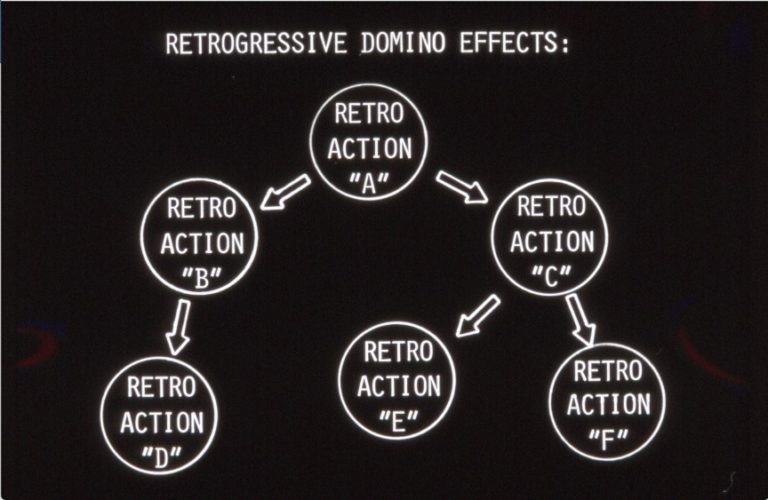
Start with the Montaigne Dogma and connect all of these regressive domino effects until you end up with hanging children and incarcerating children in prison camps. Because in the past man failed to build a scientific explanation of the causes of war and the causes of peace, historically, he has opposed the effect of war with his left hand while he advocates the cause of war with his right hand.
This has been man in his finest hour, illustrating how the right hand doesn’t know what the left hand is doing. Since the very first session of this seminar, I have been carefully laying the foundation for a science of war and peace. The science of war and peace are sub-sciences of a larger science called human action.
There are two salient conclusions we can reach on both the cause of war and the cause of peace. Now that all of the necessary chunks of intellectual knowledge are in place, each conclusion can be stated in a single sentence. In preparation for the first major conclusion to be reached, the assumption is our goal is to optimize war. How would you optimize war?
No value judgment is made on war as a goal. If someone has war as his goal, the science of war will demonstrate the true means to that goal. Here, then, is the first scientific conclusion: If the goal is war, then trade restriction is the true means.
In preparation for the second major conclusion to be reached, the assumption is that our goal is peace. No value judgment is made on peace as a goal. If somebody has peace as his goal, the science of peace will demonstrate the true means to that goal.
Here, then, is the second conclusion. If the goal is peace, then uncompromised free trade is the only simplex solution, the only true means. Those are the two major conclusions on war and peace.
Here are two additional conclusions on the concept of leagues of nations. If the goal is peace, then the United Nations is a false means – League of Nations, what have you. Furthermore, if the goal is to unite the nations, as in United Nations, then free trade is the only true means.
Just out of curiosity, I’m going to ask you three questions, and I want a show of hands. Three questions, quickly. I’ll give you all three so you can respond. Number one: Before this seminar, you had a negative image of the U.N. largely; two, you had a positive image of the U.N. largely; or, three, you had a neutral image of the U.N.?
I want to see a show of hands. How many of you, prior to the seminar, had largely a negative image of the U.N.? Let me see, show of hands. All right, that’s about three-quarters of you. How many had a positive image of the U.N.? All right, that’s about maybe 20 percent of you. How many had a neutral image of the U.N.? That’s another 20 percent or so.
If you come into the seminar with a negative image of the U.N., it is very easy to think at this point, you know, I never did like that U.N. anyhow, Snelson. Boy, Snelson sure confirmed that I don’t like it. If this is your reaction, then you missed the whole point. What is different about this seminar is that I’m giving you a scientific refutation of the concept of all leagues of nations, all united nations.
If the goal is peace, these are all false means. That is a scientific conclusion, not merely an arbitrary opinion that the U.N. is a dangerous and destructive mechanism. And so, the delegates and various members of the United Nations are dedicated to the promulgation of political interventionism throughout the world. In the name of peace, they are all promulgators of war.
This should come as no surprise when you consider almost all of them are professional what? They’re all professional politicians and bureaucrats. And all politicians are professional confiscators, and they are specialists in the art of interventionism. This does not mean they’re all bad men. I didn’t say that. They are largely good men.
But this does not alter the fact they pose the greatest threat there is to the continued existence of our species. If it were not for the magnitude of the threat they represent, we could coexist with politicians forever. But the solution to the problem of war is not to oppose war any more than the solution to the problem of yellow fever is to oppose yellow fever.
The great problem confronting Walter Reed and William Gorgas at the beginning of this century was how to get across one simplex solution. Let’s look at it again.
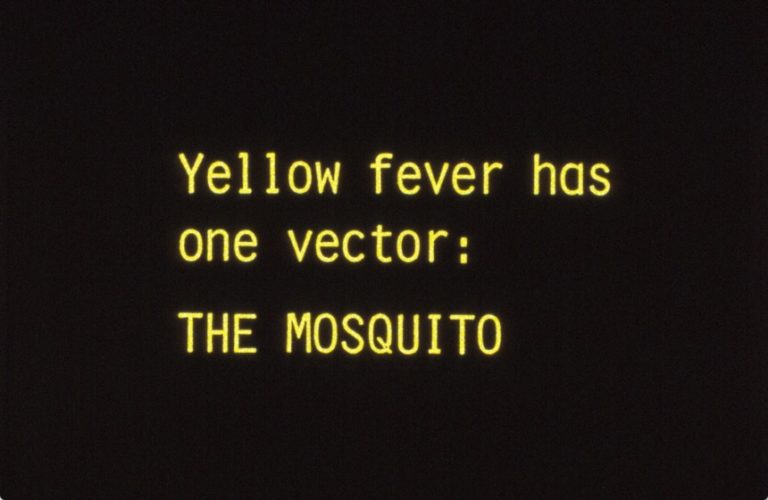
Yellow fever has one vector, the mosquito. As you know, vector is the transmitting agent. Today, we are confronted with an even greater problem of getting across an equally simplex message that is this:
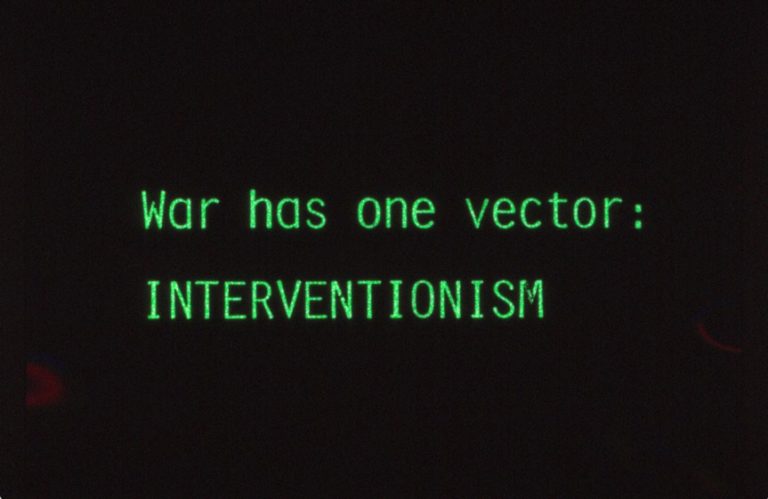
War has one vector: interventionism. In the case of yellow fever, William Gorgas, understanding the cause, found a panacea cure. In the case of smallpox, Edward Jenner, understanding the cause, found there is a panacea cure for smallpox: Apply the biological action sciences principle of immunization.
But is there a panacea cure, a simplex cure for the complex problem of war? I have some sensational news for you. Sensational means exceedingly great. There is a panacea cure for war? Apply the human action sciences principle of free trade. Part of the solution comes with the recognition that free trade is a principle that cannot be violated, because as soon as you violate it, there is no longer free trade.
As soon as you interfere with free trade, you set in motion the regressive domino effects that lead to war, and so world prosperity can only come from the fruits of a new marriage. The world’s most productive marriage will arrive with the consummation of the principle of the division of labor with the principle of free trade.
Through your understanding of these principles, I am inviting you to become one of the matchmakers of this magnificent marriage. I said earlier that most of the knowledge necessary for the cure of man’s most formidable social disease, war, has been available really for a century and a half. The intellectual evolution toward free trade was fully launched a century and a half ago by the founder of the classical school of economics, David Ricardo.
The arguments of Smith in Scotland, Ricardo in England, Bastiat in France, and others gave us the intellectual foundation for a science of external free trade between nations. They also gave us a foundation to start building a science of internal free trade within nations.
Where the classical economists did not go far enough was in the building of a fully consistent and integrated science of both external and internal free trade. Here is where we will be concentrating our science during the remainder of the seminar. Here’s the whole rest of the seminar in a sentence: The means to peace is not only free trade between each nation, but free trade within each nation.
As I will illustrate, if we cannot achieve internal free trade within a nation, then the regressive domino effects of that internal interference will lead to external interference with free trade. The internal interference with free trade within a nation starts an external war, which soon spreads, causing external interference with free trade, which leads to external war between nations.
I hope at this juncture it is clear to all of you that if we reject free trade, we reject peace. Starting, then, with the second half of this century and from now on, to reject peace is to embrace oblivion. But we are putting into your minds and hands a new alternative, and that is to join us as matchmakers in a new marriage, and that is the social integration between external free trade and internal free trade.
Free the People publishes opinion-based articles from contributing writers. The opinions and ideas expressed do not always reflect the opinions and ideas that Free the People endorses. We believe in free speech, and in providing a platform for open dialogue. Feel free to leave a comment.

